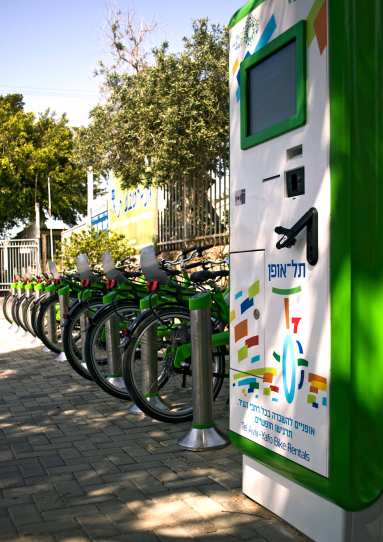
Perusing the latest bicycle news often turns up the strangest things. In a list of article links, the one with the most unusual title is also the most irresistible. The lure isn’t necessarily the topic itself, but rather the peculiarity of the topic.
A good example would be an article I stumbled upon a few days ago. I had to read the title a second time to make sure I wasn’t imagining things. It read: “Yom Kippur, bicycles, and Judaism in the Jewish State.” As one who is not an expert on Jewish affairs, it took me a moment to decipher this title.
Yom Kippur is the holiest day of the year for followers of Judaism. It is a day of atonement, which involves fasting. The “Jewish State,” mentioned in the title, refers to Israel. I could see a connection between Jewish holidays and Israel. But, where the bicycles came in, I couldn’t imagine.
Further reading was required to get to the bottom of this mystery. The article started out by referring to “the great bicycle controversy.” A bicycle controversy on Yom Kippur? I thought everyone was supposed to be fasting and atoning for their sins. Bicycle riding didn’t seem to fit into this picture.
Fortunately, the author was kind enough to explain the gist of the controversy.
“Without going into a lot of detail, this is the story: The municipality of Tel Aviv decided that individuals with paid-up memberships to a bicycle rental program could use the memberships for Yom Kippur if they picked up the bikes before the start of the holiday and returned them after the holiday was over. And not only that: the bicycles would be available to them at no charge. Transportation Minister Israel Katz threatened to reduce the city’s government funding for agreeing to this arrangement, although Katz (who is said to have studied at a Yeshiva in high school) is known to be secular. Katz was supported by representatives of the Religious parties in the Tel Aviv City Council.”
As a cyclist, my first thought was: Good, Tel Aviv has a bike share program. This is real progress in terms of making bicycles a legitimate form of transportation.
Then, I reread the paragraph to determine what the bike share had to do with Yom Kippur. I was really surprised to see a municipality giving preferential treatment to a religious group. Their proposal allowed those who celebrated the holiday to keep the rental bikes for the duration of the holiday — for free. I could see how this turned into a controversy. It would have been one thing to allow people to keep the bikes over the holiday if they paid a rental fee, but it’s another thing entirely to say that if you follow a certain religion, you can have a rental bike for free on your religious holiday.
Part of this problem stems from the demands of religious Israelis who don’t want the bike share to operate on Yom Kippur. Shutting it down, in accordance with their wishes, would prevent someone from renting a bike, but it’s unclear how it would prevent anyone from returning a bike.
In countries where more than one religion is practiced, giving preferential treatment to one religion over another is sure to lead to conflict. And, if in the name of fairness, each religion’s participants were allowed to have a free rental bike, then a bike share program wouldn’t generate enough revenue to sustain itself.
Practicalities aside, one must ask oneself what could have motivated such a decision. The obvious answer would be that this decision was an effort to pander to religious groups for political gain.
Although Israel is a Jewish state, in which Yom Kippur is a national holiday, many Israelis are secular. Secular Israelis don’t observe Yom Kippur. Shutting down the bike share, or making secular Israelis pay to keep the bikes over the holiday, is discriminatory.
Religion is a private affair, and bike sharing is a private business. When a government involves itself in private affairs, by taking a stand on religion, rather than being neutral towards all of its citizens, it alienates everyone who doesn’t follow that religion.
As if having the Israeli government interfering in the private lives of citizens wasn’t strange enough, the Israeli Minister responsible for this controversy chose to use bicycles as a way of enforcing religious tradition. Why bicycles?
This is strange for a couple of reasons. First, on Yom Kippur, Israel shuts down its public transportation system, and car use is discouraged (although not illegal). So, people are not expected to travel, other than for emergencies. Second, on Jewish holidays, work, including most forms of physical labor, is discouraged; I imagine this would include bicycle riding.
Even less clear is what the government expected them to do with the bicycles on a holiday where participants spend the entire day in synagogue. The only thing that makes sense is that they expected people to ride the bikes home for the start of the holiday and then to leave them unridden until the holiday ended.
If people are not supposed to travel or physically exert themselves, then why offer them free rental bicycles? Why not offer them something more fitting for a holiday involving atonement?
This makes me wonder what role bicycles play in Israel. They must be seen as important, or at least valuable in terms of transportation, for a government to offer them to people who are celebrating a holiday.
While it’s difficult for those of us observing from afar to know for sure what this Yom Kippur bicycle controversy is all about, it’s clear that bicycle use is becoming more mainstream in many parts of the world. I would hate to see bike share programs used as political footballs. But on the other hand, I’m glad to see bicycles as the center of attention with respect to who can use them, where and when, and under what conditions.



